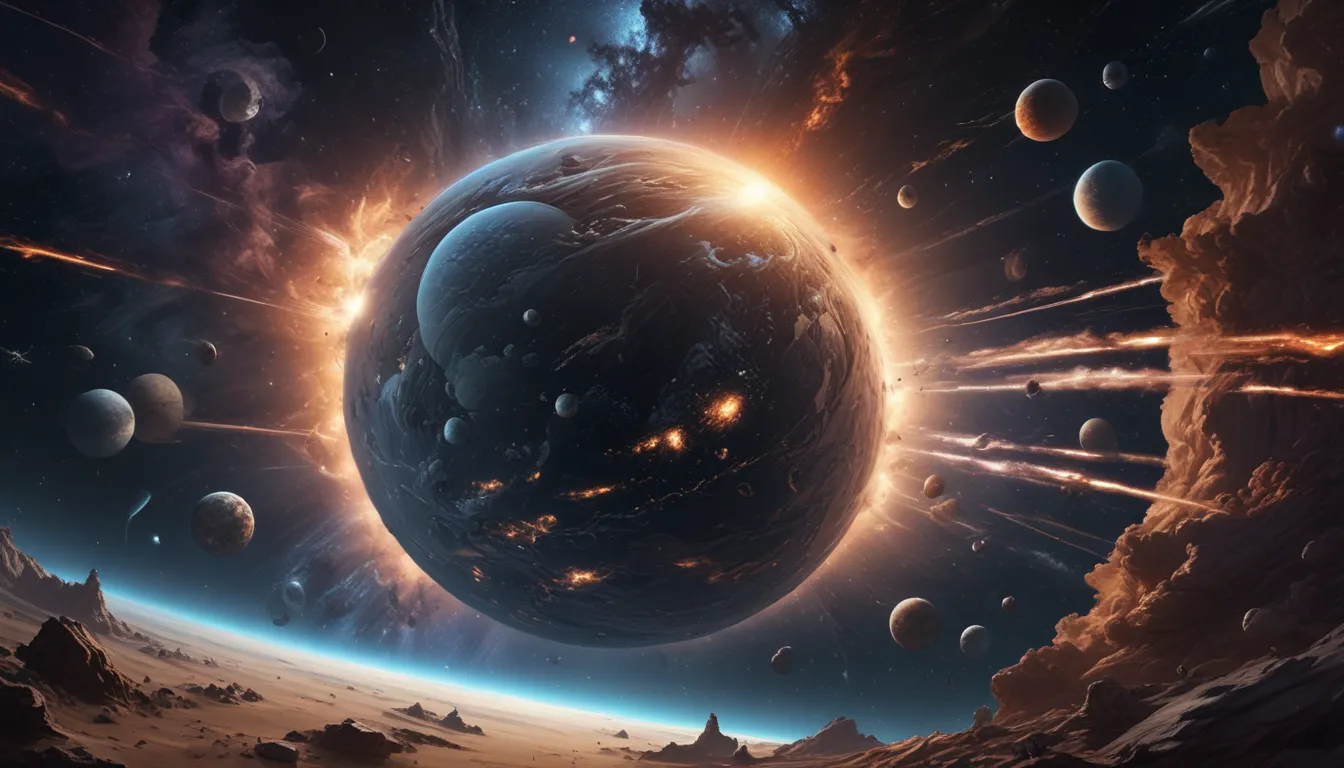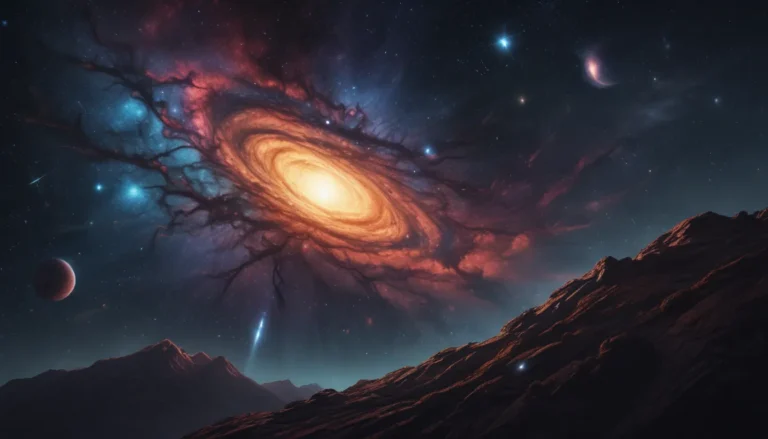The pictures we use in our articles might not show exactly what the words say. We choose these pictures to make you interested in reading more. The pictures work together with the words but don’t take their place. The words still tell you the important facts.
Are you ready to embark on a journey through the captivating realm of cosmic acceleration models? Prepare to expand your knowledge and delve into the mysteries of the universe with these 18 mind-blowing facts. As scientists tirelessly unravel the secrets of cosmic dynamics, the concept of cosmic acceleration stands as a profound enigma that challenges our understanding of the cosmos. Let's explore the various models proposed to explain this cosmic phenomenon and uncover the fascinating concepts that underlie them. From the enigmatic nature of dark energy to the mind-boggling implications for the fate of the universe, get ready to be inspired and educated about our cosmic existence.
Key Takeaways:
- The expansion of the universe is not only ongoing but accelerating, driven by mysterious dark energy, challenging our previous understanding of cosmic dynamics.
- Scientists are on a quest to unlock the secrets of cosmic acceleration, exploring various models and theories to understand the fundamental workings of the universe.
Unveiling the Mysteries of Cosmic Acceleration Models
In the captivating realm of cosmology, one of the most intriguing theories is that of cosmic acceleration. This groundbreaking concept suggests that the expansion of the universe is not merely continuing but actually gaining speed over time. It revolutionizes our previous understanding that the universe's expansion was gradually slowing down.
Shedding Light on the Dark Energy Component
At the heart of cosmic acceleration models lies the enigmatic dark energy, a mysterious entity constituting about 68% of the total energy density of the universe. Dark energy exerts a repulsive force that propels the universe's expansion to accelerate, perplexing scientists and astronomers worldwide.
Exploring the Enigma of Dark Energy
Despite relentless scientific efforts, the true nature of dark energy remains shrouded in mystery. Described as a property of space itself rather than conventional matter or energy, dark energy continues to confound researchers, sparking curiosity and intrigue in the scientific community.
Journey through Multiple Cosmic Acceleration Models
A diverse array of models has been proposed to elucidate cosmic acceleration, each offering unique characteristics and predictions. From the well-known Lambda-CDM model to quintessence and modified gravity theories, scientists explore these models to decipher the complexities of the universe's expansion.
The Interplay Between the Big Bang Theory and Cosmic Acceleration
According to the widely accepted Big Bang theory, cosmic acceleration commenced approximately 5 billion years ago. This pivotal moment marked a transition wherein the universe's expansion shifted from deceleration to acceleration, driven by the enigmatic force of dark energy.
Illuminating Evidence Supporting Cosmic Acceleration
Over the years, a wealth of observational studies has furnished compelling evidence in favor of cosmic acceleration models. Data gleaned from distant supernovae, cosmic microwave background radiation, and galaxy clustering patterns all buttress the notion of an accelerating universe, reinforcing scientists' understanding of cosmic dynamics.
Pondering the Cosmic Acceleration Dilemma
The concept of cosmic acceleration poses profound implications for the universe's future. Should the acceleration persist indefinitely, it could culminate in the cataclysmic event known as the "Big Rip," leading to the eventual disintegration of galaxies, stars, and even atomic nuclei.
Delving into the Enigma of the Hubble Constant
The Hubble constant, a cornerstone of cosmology, represents the rate at which the universe expands. Cosmic acceleration introduces a layer of complexity to determining the Hubble constant, sparking ongoing debates and refining measurements that deepen our understanding of cosmic dynamics.
An Intriguing Perspective: Quantum Vacuum Energy
Some cosmic acceleration models postulate that the energy inherent in empty space, termed vacuum energy or zero-point energy, may underpin the accelerated expansion. This notion harkens back to quantum theory concepts, serving as a fertile ground for ongoing research and exploration.
The Quest for a Unified Theory of Dark Energy
The enigma of dark energy and cosmic acceleration has galvanized intense research endeavors to craft a unified theory elucidating its origins and properties. Scientists aspire to unravel the enigmatic nature of dark energy, ushering in profound insights into the fundamental mechanisms governing the universe.
Navigating Cosmic Acceleration and the Multiverse Hypothesis
Certain cosmic acceleration models intertwine with the multiverse hypothesis, positing the existence of parallel universes. The intricate interplay between cosmic acceleration and the multiverse remains a subject of vibrant theoretical discourse and exploration within the scientific community.
Probing Cosmic Acceleration through Large-scale Surveys
Large-scale surveys such as the Sloan Digital Sky Survey and the Euclid mission play a pivotal role in testing and refining cosmic acceleration models. By amassing vast troves of observational data, these surveys empower scientists to gain deeper insights into the dynamics of cosmic expansion.
Harnessing Gravitational Waves in the Study of Cosmic Acceleration
Gravitational waves, the ripples in spacetime's fabric, present a unique avenue for investigating cosmic acceleration. Detecting and analyzing gravitational waves originating from cosmic cataclysms offer invaluable insights into the nature of dark energy and its impact on the universe's expansion.
Exploring Alternative Explanations for Cosmic Acceleration
While dark energy reigns as the prevailing hypothesis for cosmic acceleration, alternative theories have emerged. Modified gravity models challenge our understanding of gravity at cosmic scales, prompting a reevaluation of existing paradigms to accommodate observed cosmic acceleration.
Contemplating Cosmic Acceleration and Cosmological Constants
Cosmological constants such as the fine-structure constant and the gravitational constant are foundational in physics. The phenomenon of cosmic acceleration prompts intriguing inquiries into the stability and potential variations of these constants across cosmic timescales, offering tantalizing insights into the universe's fundamental constants.
Unraveling Cosmic Acceleration’s Impact on Structural Evolution
Cosmic acceleration exerts profound influences on the formation and evolution of large-scale structures in the universe. It shapes the growth of galaxy clusters, the distribution of cosmic voids, and the intricate cosmic web, unveiling critical understandings of the underlying cosmological processes.
Navigating Theoretical Challenges in Deciphering Cosmic Acceleration
Despite significant strides, cosmic acceleration remains an enduring conundrum in modern cosmology. Theoretical frameworks grapple with reconciling the observed acceleration with established laws of physics, propelling scientists to push the boundaries of knowledge in pursuit of deeper insights.
The Never-ending Quest for a Comprehensive Universe Theory
Cosmic acceleration stands as a mesmerizing piece of the puzzle in the grand quest for a comprehensive universe theory. Scientists continue to explore, experiment, and theorize, driven by an insatiable curiosity to unveil the secrets of cosmic acceleration and unravel the enigmas pervading our expansive cosmos.
Delving Deeper into Cosmic Acceleration Models
In conclusion, immersing oneself in the realm of cosmic acceleration models is pivotal for comprehending the awe-inspiring universe expansion phenomenon. Through meticulous research and observation, scientists unearth enthralling facts about these models, shedding light on the omnipresent force of dark energy and the elaborate theories elucidating cosmic acceleration. As we explore, we not only expand our cosmic knowledge but also glean practical insights into the universe's impending destiny. With each exploration and discovery, we edge closer to deciphering the mysteries of cosmic acceleration, gaining a deeper appreciation of our place in the mesmerizing cosmic expanse.
FAQs
Q: What is cosmic acceleration?
A: Cosmic acceleration entails the phenomenon wherein the universe's expansion accelerates over time, defying gravitational deceleration.
Q: What is dark energy?
A: Dark energy constitutes a hypothetical form of energy believed to propel cosmic acceleration, steering the universe's expansive journey.
Q: How do scientists study cosmic acceleration?
A: Scientists employ diverse methods, including observing distant supernovae, measuring cosmic microwave background radiation, and scrutinizing galaxy distribution to unravel the mysteries of cosmic acceleration.
Q: Do different models explain cosmic acceleration?
A: Yes, various models such as the Lambda-CDM model, quintessence, and modified gravity theories offer explanations for the cosmic acceleration phenomenon.
Q: What are the implications of cosmic acceleration?
A: Cosmic acceleration models hold implications for comprehending the universe's future trajectory and the forces shaping its evolution, unveiling insights into fundamental cosmic energies and dynamics.
Q: Are practical applications derived from the study of cosmic acceleration?
A: While immediate practical applications may be scarce, delving into cosmic acceleration advances our knowledge of the universe's intricacies, laying foundations for potential astrophysical and cosmological breakthroughs.
Embark on a journey of cosmic exploration and marvel at the intricate dance of cosmic acceleration models, unveiling the mysteries that shape our boundless cosmos. As we navigate the enigmatic realms of dark energy and cosmic evolution, we gain profound insights into the universe's enigmatic forces and mechanisms. Join us in unlocking the secrets of cosmic acceleration and embracing the awe-inspiring wonders that lie beyond the confines of our cosmic horizon. Explore, discover, and ponder the infinite mysteries of our cosmic existence.






